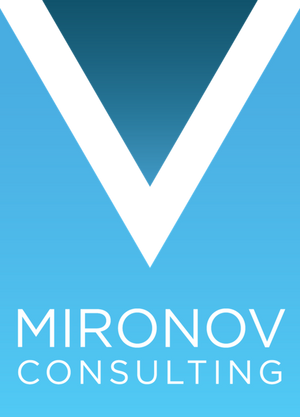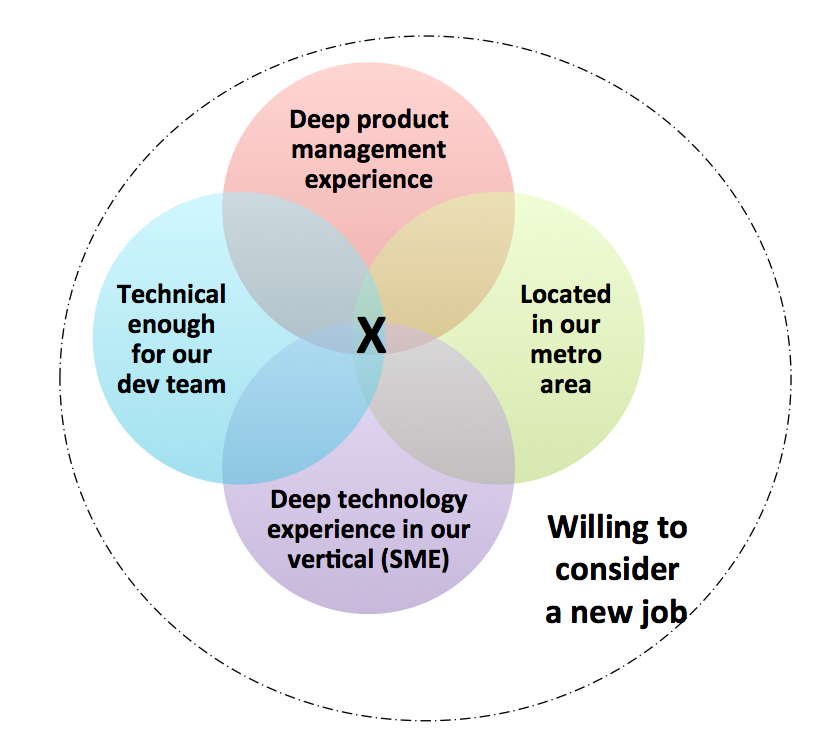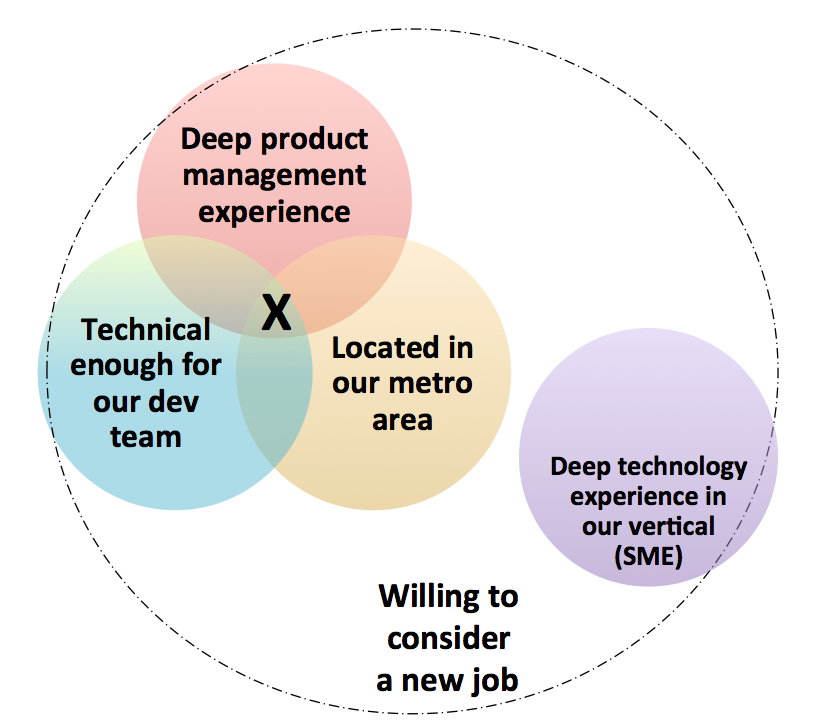I spent part of last week interviewing product management candidates on behalf of a client far from Silicon Valley. This is a key hire for them, injecting product management into a technology group that has (until now) had gone without. Since I defined the position and wrote the job description, it’s an opportunity to compare my hiring biases against our market sample.
As is typical, we’re looking for candidate with demonstrated product management chops AND experience in a narrow solution space AND enough software development skills to work credibly with Engineering AND within commuting distance of their R&D facility. Plus a willingness to leave their current role. Certainly not easy people to find. I refer to such perfect candidates as unicorns: rare beasts, sometimes entirely mythical.
Fans of set theory might represent it this way:
After working through a slate of good candidates, we realized that we might not find everything in one individual. It became important, therefore, to prioritize. Which talents and experience MUST we have, which can a strong candidate learn on arrival, and which do we set aside for additional hires?
I rank these according to my own well-established biases:
1. Has experience product managing a revenue product/service at a technology company. With a product management title.
I strongly believe that the product management role demands a unique mix of technical skills, business tools, organizational savvy and real-world revenue-customer experience. The first year is very challenging, with a predictable set of hurdles:
- Facing down paying customers who have reasonable (or unreasonable) feature requests that are not on the roadmap
- Patiently explaining to execs (again) that adding their really good idea into the plan requires us pushing out another really good idea
- Exploring simpler (faster) partial solutions to technical problems with developers who want to design all-purpose (complex) architectures
- Updating the roadmap (again) and backlog (again) to reflect the new new development reality
- Dealing with salespeople who’ve made customer commitments without approval
So I value folks with actual hands-on, front-line product management experience. Who have been there and taken their lumps.
I mostly reject “similar role” stories. Project managers, development leads, scrum masters and dev product owners, consulting team leaders and sales engineers who’ve done “something like product management” are not who I’m looking for. Exception: well-established product teams with strong leadership, solid cross-functional relationships and willingness to mentor a newly fledged PM.
2. Technical enough to stand up to the development team
Developers are harsh critics of marginally technical product managers, especially on B2B or complex infrastructure products. Right or wrong, they tend to write off a new arrival that lacks software street cred. A BSCS or BSEE isn’t specifically required, but someone who understands the software creation process, hold their own on detailed requirements, and knows why automated testing is critical to success. IMO, hiring a tech lightweight is setting that candidate up for failure.
3. Be physically in the office with the development team, at least half time.
IMHO, there’s no substitute for in-person, face-to-face, see-my-raised-eyebrow contact. Lunch with the team. Water cooler chats. Figuring out which junior developer is worth three of her managers. Surprising the development team with pizza. So while I appreciate conference calls, WebEx, Rally, nuanced emails and occasional full-day review sessions, I want a product manager who is co-located with the development team. (Hint: a development team that is itself co-located makes this much easier.) So I search for candidates who live near R&D, or are willing to move.
Full stop. Three criteria look like this:
Not easy to find, and possible that we’ve already over-specified. Some metro areas may be too short of seasoned product managers to check all three boxes. If pressed, I’d consider a half-time product manager commuting from oh-far-away.
So the rest of my list has to be “below the fold.” How to justify this?
4. Vertical expertise and subject matter expert (SME)
I’d love to have a new product manager who already knows (for instance) geo-tagged housing prices. Or wireless intrusion detection. Or the intricacies of mapping Pantone colors to RGB monitors. Or the autonomous car market. But if I’m looking for a seasoned product manager with technical chops located in Chicago (#1, #2 and #3 above), hands-on experience with online dating apps (ahem!) may be too much to ask.
Experienced product managers are used to learning new markets, meeting new customer groups, grappling with unfamiliar tech, and training new channels. If that’s too risky, consider adding an expert in your narrow technology or vertical alongside product management.
5. Solid UX/UI Experience.
Especially for consumer-facing products, the user experience/user interface represents a lot of what the product “is.” Great design sense is a requirement of the development team. I think it’s usually unreasonable, though, to add to our candidate screen. UI/UX professionals bring their own craft, process, sensibility and tools to the real problem of designing coherent applications. I salute any product manager who can do this, but am not comfortable demanding it.
6. Specific academic degrees.
I have a technical undergraduate degree and an MBA, both of which have been very helpful over the years. (Tom Gibbings referred to these “Engineering MBAs” in a note to me.) It’s not the degrees that matter, though, but what they’ve been used for along the way. I listen hard during interviews for alternate learning: off-hours at Codecademy, pricing models for a startup, time spent analyzing competing offerings. Candidates who remind me that high-priced degrees are only one way to gather and demonstrate skills.
Notice that we haven’t yet gotten to salary, benefits, or the relative desirability of your company versus the competition. It’s up to you — the hiring manager — to close a great candidate once you find her. Remembering that a long-unfilled product management slot carries its own costs.
Sound Byte
Clear priorities among your requirements helps you keep your search realistic. Don’t hunt only for unicorns.



